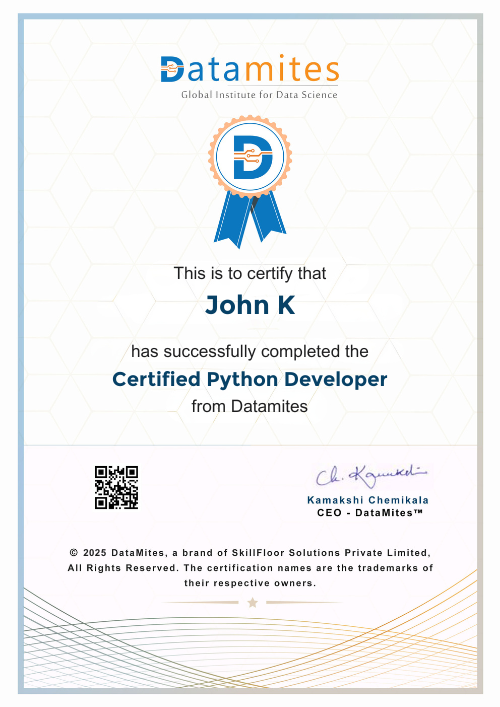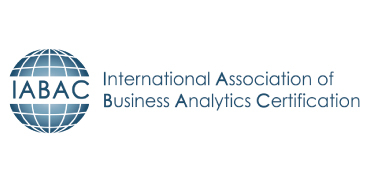Instructor Led Live Online
Self Learning + Live Mentoring
Customize Your Training

• Introduction of python
• Installation of Python and IDE
• Python Variables
• Python basic data types
• Number & Booleans, strings
• Arithmetic Operators
• Comparison Operators
• Assignment Operators
• IF Conditional statement
• IF-ELSE
• NESTED IF
• Python Loops basics
• WHILE Statement
• FOR statements
• BREAK and CONTINUE statements
• Basic data structure in python
• Basics of List
• List: Object, methods
• Tuple: Object, methods
• Sets: Object, methods
• Dictionary: Object, methods
• Functions basics
• Function Parameter passing
• Lambda functions
• Map, reduce, filter functions
• Decorators
• Generators
• Context Managers
• Metaclasses
• Inheritance and Polymorphism
• Encapsulation and Abstraction
• Class methods and static methods
• Special (magic/dunder) methods
• Property decorators - getters, setters, and deletes
• Working with files
• Reading and writing files
• Buffered read and write
• Other file methods
• Logging & Debugger
• Modules and import statements
• SQL Basics
• Creating DB Table
• INSERT, READ, UPDATE, DELETE
• Introduction to MongoDB
• CRUD operations in MongoDB
• namedtuple(), deque, ChainMap,
• Counter, OrderedDict, defaultdict,
• UserDict, UserList, UserString
• Exceptions handling with try-except
• Custom exception handling
• List of general use exception
• Best practice exception handling
• Generators, Iterators
• The Functions any and all
• With Statement
• Data Compression
• A Daytime Server
• Clients and Servers
• The Client and Server Programs
• Classes and Threads
• Multi-threading; thread life cycle
• Regular Expression Syntax
• Group, Split and wildcards
• Quantifiers
• Match, Search and Find all methods
• Character Sequence
• Introduction to OpenCV, Installation
• Basic Operations on Images
• Image Filtering
• Image Classification
• Introduction to GIT
• Basic Git commands
• Introduction to Flask and Installation
• Creating project
• Routing,templates, forms and database integration
• Deployment on render
• Django Introduction and Installation
• Creating a Project
• Django Architecture and File Structure
• Folder Structure, First Django project
• Database and Views, Static Files and Forms
• URL Mapping and Routing
• Defining Models and Relationships
• Database Migrations and Schema Changes
• Querying Data using Django ORM
• Model Forms and Form Validation
• HTML Forms in Django
• Model Forms and Form Validation
• Formsets and Inline Formsets
• File Uploads and Validation
• Deploying Django Applications
• Hosting Options (e.g., Heroku, AWS)
• Project Showcasing and Review
Python is a versatile and easy-to-learn programming language that is widely used for various applications such as web development, data analysis, machine learning, and scientific computing. It is known for its simplicity, readability, and dynamic typing, making it a popular choice for beginners and professionals alike. Additionally, Python has a large standard library and active community, providing developers with access to a wealth of resources and support.
Python is an attractive choice for developers due to its simplicity, ease of learning, versatility, extensive libraries, and a large community of developers. Python has been adopted by several organizations, including Google, NASA, and Facebook, making it a popular language among developers.
It's difficult to determine which programming language is superior, Python or C++, since both have their own advantages and disadvantages. Python is easier to learn and read and has extensive libraries, making it an excellent choice for beginners and popular for scientific computing and web development. Meanwhile, C++ is incredibly efficient and can handle low-level programming tasks, making it ideal for high-performance application development, game development, and operating systems. The selection between Python and C++ depends on the specific project requirements and the programmer's skill level.
Python's popularity can be attributed to its intuitive syntax, easy-to-learn nature, extensive libraries, and adaptability to various domains and industries.
Python is generally considered easy to learn, thanks to its straightforward syntax and extensive community support.
Learning Python programming language can enhance job prospects and open up opportunities in fields such as data science, machine learning, artificial intelligence, and software development, among others.
No, there are no specific requirements for enrolling in Python courses in the London.
The fees for Python courses can vary based on the level of training being offered. Generally, the fee structure for classroom training by different providers in Python ranges from 200 GBP to 400 GBP.
While familiarity with basic mathematical concepts can be helpful, it is not necessary to have a strong mathematical background to learn Python.
Online Python courses in the London may have a slightly different duration compared to classroom-based courses depending on the course structure and delivery mode.
According to glassdoor.com, a python developer in London earns an average yearly salary of £62,048 !
DataMites is the institute in the London that provides effective Python training that caters to both beginners and advanced learners.
The Certified Python Developer course is highly recommended for establishing a successful career in Python, offering practical exercises, real-world projects, personalized attention from experienced trainers, and a globally recognized certification from IABAC.
The DataMites Certified Python Developer Training in the London is suitable for both beginners and experienced professionals, so prior experience is not necessary, although having some basic knowledge of programming concepts and logic could be helpful.
The comprehensive curriculum, experienced trainers, personalized attention, flexible online learning options, globally recognized certification, and real-world internship opportunities offered by DataMites are all beneficial for learners.
DataMites offers a basic Python course that typically takes 4 to 6 weeks to complete, while the advanced course may take up to 12 weeks. The online Python course is self-paced, and learners can complete it at their convenience. The Certified Python Developer Course in the London takes four months.
Generally speaking, the python course fee in the London can vary from 194 GBP to 360 GBP depending on the level of course and mode of training you choose to go for.
While DataMites does not offer offline Python training in London, our online courses provide learners with the flexibility to learn from anywhere and at any time.
The Flexi Pass by DataMites is an offering that empowers learners to attend three courses of their preference from a wide range of courses within a year, with the flexibility to learn at their convenience and pace, and with access to additional benefits.
Completing Python training at DataMites can provide learners with a certification that is recognized by various industries and can enhance their career prospects. The certification demonstrates proficiency in Python programming and can help in job opportunities and career advancement.
You can enroll in the DataMites Python training online in the London using any of the payment methods available, such as debit/credit card, net banking, PayPal, and other digital payment modes.
The DataMites Placement Assistance Team(PAT) facilitates the aspirants in taking all the necessary steps in starting their career in Data Science. Some of the services provided by PAT are: -
The DataMites Placement Assistance Team(PAT) conducts sessions on career mentoring for the aspirants with a view of helping them realize the purpose they have to serve when they step into the corporate world. The students are guided by industry experts about the various possibilities in the Data Science career, this will help the aspirants to draw a clear picture of the career options available. Also, they will be made knowledgeable about the various obstacles they are likely to face as a fresher in the field, and how they can tackle.
No, PAT does not promise a job, but it helps the aspirants to build the required potential needed in landing a career. The aspirants can capitalize on the acquired skills, in the long run, to a successful career in Data Science.



